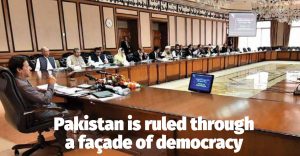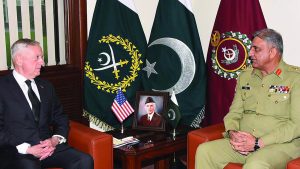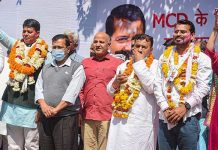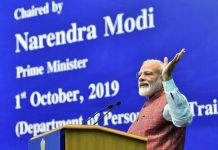 The Pakistani establishment, a softer expression for its Army-led ruling clique, has succeeded in manoeuvring the main pillars of the democratic polity, the legislature, media and the judiciary. The executive, the prime minister and his cabinet is subservient to the generals, both overtly and covertly. The country is presently being ruled through a façade of democracy. Initially, those who control the country appeared to be successful in projecting and then installing a popular figure as its prime minister, but now it stands exposed. Pakistan’s main supporters, USA and China, directly deal with the generals. They get the decisions or agreements reached with the political government get endorsed by the generals. India too has learned this reality, but only after the Kargil aggression. The Pakistani Army not only rejected the peace initiative of the two prime ministers, Atal Behari Vajpayee and Nawaz Sharif, but dared engage India in a war ignoring the saner advice of its civilian government. Sharif was dismissed.
The Pakistani establishment, a softer expression for its Army-led ruling clique, has succeeded in manoeuvring the main pillars of the democratic polity, the legislature, media and the judiciary. The executive, the prime minister and his cabinet is subservient to the generals, both overtly and covertly. The country is presently being ruled through a façade of democracy. Initially, those who control the country appeared to be successful in projecting and then installing a popular figure as its prime minister, but now it stands exposed. Pakistan’s main supporters, USA and China, directly deal with the generals. They get the decisions or agreements reached with the political government get endorsed by the generals. India too has learned this reality, but only after the Kargil aggression. The Pakistani Army not only rejected the peace initiative of the two prime ministers, Atal Behari Vajpayee and Nawaz Sharif, but dared engage India in a war ignoring the saner advice of its civilian government. Sharif was dismissed.
During the recent tenure of Sharif, he did not have a foreign minister, instead this crucial ministry was handled by Sartaj Aziz, an expert in foreign affairs directly reporting to the General Army Headquarters (GHQ). In the strategic affairs, if the civilian leaders found inconvenient, they are sacked, exiled, jailed or hanged. Sharif was fortunate to be spared being sent to gallows, but he is put behind bars under various charges, with hardly any substance. For GHQ, he was increasingly becoming inconvenient, because he had exposed the generals’ power games and their key role in promoting the so-called non-state players. With a planning or conspiracies hatched by the GHQ and its secret service outfit, Inter-services Intelligence (ISI), Imran Khan and his political party, Pakistan Tehreek-e-Insaf (PTI) emerged on the centre-stage of the politics. Shah Mehmood Qureshi, a favorite of generals, who also had served in the Musharraf’s government, became the vice-president of this new party, which came into being in 1996.
The Army generals knew that Sharif is keen for a genuine peace with India. He would oppose any encouragement to the Canada based Khalistanis and favoured action against those who mastermind of the Mumbai terrorist attack and other mischievous activities of the Army and ISI. There were reports that for the past two years the new conspiracy against India was being hatched. Now an inconvenient prime minister sacked and implicated in corruption cases, the new Pakistani game is now exposed.
Sharif’s another crime was his reluctance to the handing over of Baluchistan to China under the pretext of CPEC (China Pakistan Economic Corridor), which is much more than an economic cooperation between the two countries with the setting up of a naval base at Gwador and providing strong optical fibre connectivity of the GHQ with the PLA (People’s Liberation Army) of China. The GHQ is convinced that with the exit of USA from Afghanistan, Pakistan with its new collaborator, China, will play the key-role in the region. The new prime minister, who is known for his innocence, could be used by Qureshi and GHQ without any hurdle in the political system.
To ensure its absolute control on the political executive, the GHQ operating through the ISI had ensured election victory to Imran Khan, the most popular face of Pakistan and his party, Pakistan Tehreek-e-Insaf. It also ensured Khan divorces his journalist wife, Reham, a follower of pure Islam of the Deobandi school. His new wife, Bushra Maneka, is reportedly having close ties with the establishment. Her control on Khan’s personal life is quite known that he could not invite his London-based sons in the swearing-in ceremony. Bushra asserted and Khan conceded. It all happened a few months before the polls, when all possible tricks, money and threats were unleashed to ensure Khan’s majority.
The GHQ has succeeded in manipulating media too. Earlier, the press was quite assertive and could even dare the military rulers. Many journalists were imprisoned and suffered personal violence too. During the elections, a number of journalists were picked up by ISI operatives, and they were silenced. Apart from this technique, a number of electronic channels with highly paid journalists and anchors came into being in recent years to project Army as the only saviour of the country. These channels malign India and openly undermine the political leaders. In case of Sharif and his family, these channels painted him a rogue leader undermining Pakistani interests. The third challenge, the GHQ could have faced from judiciary, too is now being fully manipulated. Earlier, during the regime of General Zia-ul-Haq, an elected prime minister was first deposed and then hanged through a sham judicial process. Emboldened by the past experiences, and the new organization, National Accountability Bureau (NAB), GHQ ensured removal of a sitting Prime Minister, Nawaz Sharif, under the pretext of corruption charges that too under a democratic regime! Sharif lost his wife during the present jail term. His daughter, Mariam, who now symbolizes the woman power of the country, too is undergoing prison term.
 Within a few years of its existence as a country only for Muslims, Pakistani Army started functioning as the supreme authority. The British Indian Army, which had recruited a large number of Punjabi Muslims during the World War-II years, continued in the force till the country was partitioned in 1947. It was a much larger force than the new country needed, but its political clout enabled it to the main ruling elite. Since there were no land reforms and the rich and powerful retained their huge properties, both urban and rural, they became the key supporters of the successive military coups in the country. It all began in 1954, when the Ghulam Mohammed government dissolved the Constituent Assembly. Its members were elected during the united India days under British, and had formed a constituent assembly, a counter-part of the Indian legislature, which drafted the Constitution and got it promulgated on January 26, 1950. The dissolution was challenged, but the Pakistani Supreme Court upheld the dissolution under the pretext of Law of Necessity. The then chief justice of Pakistan, Muhammed Muneer, who had justified the dissolution by inventing this logic, has regretted his decision in his book, Jinnah to Zia. However, it is now too late.
Within a few years of its existence as a country only for Muslims, Pakistani Army started functioning as the supreme authority. The British Indian Army, which had recruited a large number of Punjabi Muslims during the World War-II years, continued in the force till the country was partitioned in 1947. It was a much larger force than the new country needed, but its political clout enabled it to the main ruling elite. Since there were no land reforms and the rich and powerful retained their huge properties, both urban and rural, they became the key supporters of the successive military coups in the country. It all began in 1954, when the Ghulam Mohammed government dissolved the Constituent Assembly. Its members were elected during the united India days under British, and had formed a constituent assembly, a counter-part of the Indian legislature, which drafted the Constitution and got it promulgated on January 26, 1950. The dissolution was challenged, but the Pakistani Supreme Court upheld the dissolution under the pretext of Law of Necessity. The then chief justice of Pakistan, Muhammed Muneer, who had justified the dissolution by inventing this logic, has regretted his decision in his book, Jinnah to Zia. However, it is now too late.
In its effort to challenge the Bengalis of East Pakistan, now Bangladesh, in 1954, the then Pakistani prime minister, Muhammed Ali Bogra merged the provinces of the West Pakistan in one unit. The Pakistani Constitution enacted during the regime of Martial Law Administrator General Ayub Khan too endorsed this merger of all the provinces. However, it later years, the provinces were restored their old identities, but the political clout increased manifold. In spite of committing genocide, the Army continued to assert in the Western Pakistan. Pakistan, perhaps, is only country, where the democratically elected prime minister is summoned the General Headquarters, to explain his conduct before the generals. The present strategy of the establishment is to ensure a pliable government using all possible tricks, which included pressurizing the local leaders to join the political outfit being patronised by the forces.
This practice was not so much exposed during the regimes of military junta under Ayub Khan, Iskander Mirza, Zia-ul Haq and Musharraf years. The establishment used to keep and promote only those politicians, who were ready to follow its diktats, but it did not rule directly. However, the role of Army is now much more pronounced. During the swearing-in ceremony of Imran Khan, Army chief Bajwa tells the Indian cricketer-turned comedian and politician, Navjot Singh Sidhu, that we are ready to open the Kartar Singh corridor enabling Sikh pilgrims to visit the place, where Guru Nanak had breathed his last. Like a brainless parrot, Sidhu, promotes this suggestion, and the corridor was inaugurated amidst the presence of Khalistanis. Siddhu, who was seen sitting with the Hafiz Saeed, the mastermind of the Mumbai explosions, did not mind sharing a place with the Khalistanis, who are keen to revive the Sikh militancy in the Punjab in India.
They were just lap dogs and if they ever asserted they were either hanged or exiled. Z.A. Bhutto used to call General Ayub Khan “papa” and as a favourite of the Army he persuaded Ayub Khan’s successor, Iskander Mirza, to crush the Awami League, which had won majority in the Pakistan National Assembly, by its overwhelming victory in the Eastern wing of Pakistan, now Bangladesh, where the majority of Pakistanis were living. These dark complexioned short-highted Muslims, though they had led the Muslim homeland movement in British India had to be crushed. Their crime was that in spite of being Muslims, they declined to snap their traditional culturally Indian identity. The tall Punjabi Muslims , who believed themselves racially superior, not only declined to accept the democratically elected Mujibur Rehman, but triggered off genocide against the common Bengali Muslims. The Pakistani Army having majority Punjabis not only massacred half-a-million East Bengal Muslims, also violated 350,000 women to improve their breed!
Bhutto, though initially a favourite of the establishment, was hanged by a fake judicial process by General Zia-ul-Haq. Bhutto, who as the new prime minister of West Pakistan, now named Pakistan, was elevated as the Army chief superseding a number of military officers. Bhutto’s Peoples’ Party was ousted by the Pakistani Muslim League (Noon) led by Nawaz Sharif. Earlier, Musharraf ensured that Bhutto’s daughter, Benazir, too is eliminated by the goons having tacit support of the Pakistani Army. During the tenure of the People’s Party’s rule, Pakistani Army and its intelligence wing, Inter-Services Intelligence (ISI) continued to promote the non-state players, the Jihadis and terrorist mainly focused against India and Afghanistan. The ISI was the brain child of the British officer, Major General Sir Robert Cawthrone was deployed in the Pakistani Army to lead the Muslim soldiers of the newly created state. The intelligence agency came into being following the failure of Pakistani forces to occupy Jammu and Kashmir in 1948. During the Zia regime ISI was entrusted to keep a vigil on the country’s political parties, mainly, the People’s Party and the leftists.
Sharif too suffered because he wanted to establish political superiority in the administration. A two-pronged strategy was evolved to finally depose Sharif and his party from the power structure. The institution of the National Accountability Bureau (NAB) with the pronounced purpose of prosecuting corrupt officials and politicians was cleverly used to jail Sharif and his daughter Mariam. The current chief justice of Pakistan, Mian Saqib Nisar, is currently in London to raise funds for his resource-starved country. Some media channels raised that how he could stay in lavish hotels paying huge stay cost estimated to be 1,000 pounds per day, but the story was withdrawn within an hour of its circulation. The judiciary too is now a part of the GHQ!
letters@tehelka.com










